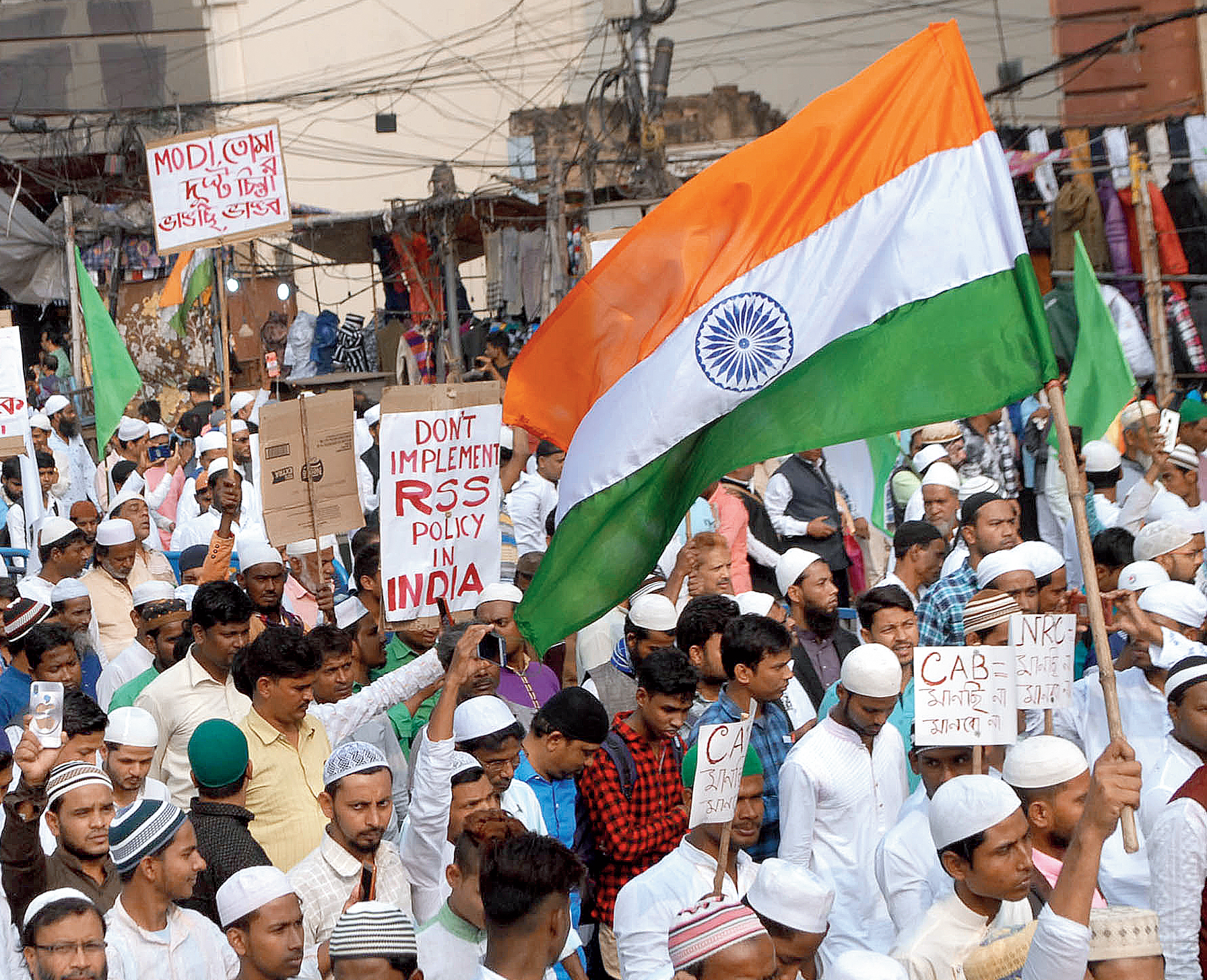Thousands of Muslims in different parts of Bengal hit the streets after Friday prayers to protest the Citizenship (Amendment) Act and demand its withdrawal, mirroring the deep-rooted insecurity among the minority community that makes up around 28 per cent of the state’s population with the new law.
There were some stray instances — at Beldanga in Murshidabad, Arambag in Hooghly and Uluberia in Howrah — of violence, but those helming the protests have declared in no uncertain terms that the movement will be peaceful and inclusive and won’t deviate from the country’s secular principles.
The BJP was quick to blame “infiltrators”, the segment the party wants to uproot through legislation like the NRC, for the instances of violence.
State government sources said the protests were largely peaceful, culminating mostly in sit-ins on main thoroughfares that caused minor disruptions to traffic and that the situation was under control.
“These protests are spontaneous, but I have requested them not to cause hardship to people as the people are the backbone of any form of protest,” said chief minister Mamata Banerjee, who is planning movements from Monday against the “twin blows of NRC-CAB (as the bill was known before it was signed into law)”.
The protests on the roads that started in the afternoon took the form of small meetings and street-corner gatherings in Muslim-dominated areas as community leaders began drawing up plans on how to take the movement forward and get larger sections of the society to endorse their demands.
The community leaders who spearheaded the protests made it amply clear that they wanted its character to be inclusive as the message from the venues was essentially secular. The speakers iterated their faith in the Constitution and requesting all other communities to join the protests.
Chants of “Hindustan zindabad” were heard at many of the venues, where participants carried the Tricolour.
“Our Muslim community feels dejected with the passage of the bill at a time they are already worried about the possible repercussions of a rollout of an NRC exercise in Bengal. But it is also true that the community knows that the protest will have legitimacy if they keep it non-violent and secular,” said Imtiaz Molla, the convenor of the Joint Forum Against NRC, a fledgling rights group.
Reports from Calcutta and the districts suggested that the protests on Friday were largely apolitical and the gatherings after the Friday prayers were organised by different minority organisations such as the Jamaat-e-Islami Hind, Jamiat Ulema-e-Hind and local outfits of imams and muezzins.
Several Muslim leaders this newspaper spoke to said they had specified at the planning stage itself that the protests would be non-violent and the speakers would uphold the secular tradition of India.
At a rally organised by the Jamaat-e-Islami Hind in Calcutta, representatives of other communities were also seen marching from the Tipu Sultan mosque to the Gandhi statue at Maidan. The other two prominent gatherings in the city were at Park Circus and Belgachhia.
At Belgachhia, Alhaj Maulana Mohammad Moinuddin Qasmi, one of the speakers, reminded the audience of the secular fabric of the country. Another speaker, Haji Wasim Khan, spoke about the sacrifices made by Muslims during the country’s freedom struggle.
“If the protests become only a Muslim affair, that will help the BJP-RSS, which wants to divide the country along religious lines,” said Hasnain Imam, a schoolteacher in Calcutta.
According to him, ordinary Muslims have been joining the protests out of a deep sense of fear.
“Someone just wrote a Facebook post yesterday evening asking people to congregate at 7pm at Park Circus, and within no time at least 1,000 people gathered, cutting across political lines. This happens when there is fear,” Imam said.
Mamata has been trying to allay the fears since the BJP upped its NRC rhetoric with the pledge to enforce it across the country to identify and drive out “infiltrators”.










